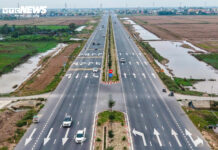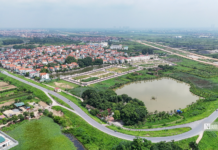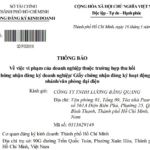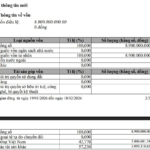“Unlocking” Agricultural Land’s Potential
Nguyen Van Dinh, a real estate legal expert, believes that
there is a lot of agricultural land being wasted due to abandonment, and hopes that the 2024 Land Law will “unlock” the potential of this land.
Mr. Dinh gives a typical example of when people combine agricultural land with aquaculture or other business models. Although it is not the intended use, shrimp farming can bring in 30 times more revenue than rice farming, so people will find a way to make it work.
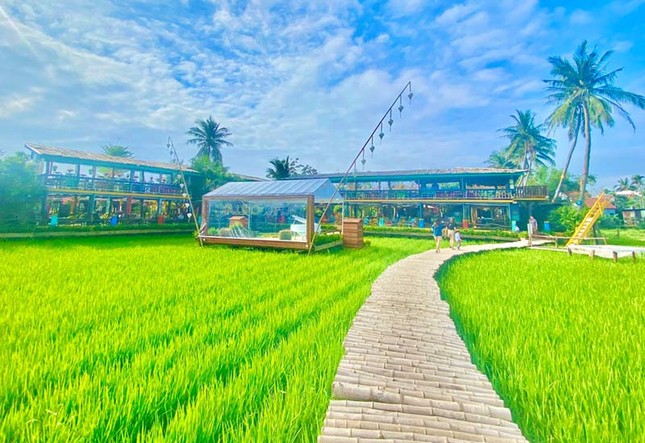
An illustrative example of a cafe in a rice field in Hoi An, Quang Nam.
In another case, combining rice farming with business models like cafe farms can bring numerous benefits. Monthly revenue can surpass that of rice farming for the entire year, but without a legal framework, this is considered an illegal activity. Meanwhile, some poorer provinces have allowed the development of golf courses, urban areas, and industrial zones, which has led to their economic growth.
According to Mr. Dinh, rice farming is crucial for ensuring national food security, but rice farmers need a mechanism to protect their interests. “I highly appreciate the balanced development focus of the 2024 Land Law. Notably, it includes provincial planning for rice farming to preserve rice fields and provides tools for budget regulation under relevant laws to support these provinces financially,” Mr. Dinh explains.
The 2024 Land Law also permits people to use agricultural land for combined rice farming and business activities. However, they must present their plans to the managing authorities to ensure strict control when using agricultural land for commercial services. This will harmonize the interests of the stakeholders, the state, and the people. If people benefit from using the land for commercial services, they should contribute a portion of their earnings to the state budget.
A critical issue is how to combine agricultural land with business activities while preventing the illegal conversion of land use for concrete buildings, which would make it impossible to restore the land to its original rice-growing state. This is a delicate balance between permitted land use combinations and illegal land use conversion.
Using Agricultural Land for Homestay and Farmstay Businesses
Regarding the rampant and unplanned development of homestay and farmstay businesses, Mr. Le Van Binh, Deputy Director of the Land Department (Ministry of Natural Resources and Environment), shared his personal perspective: There are two approaches to implementing this model. The first is when agricultural producers use their land for tourism purposes. The second approach involves tourism land being used for agricultural activities, which falls under commercial land use.
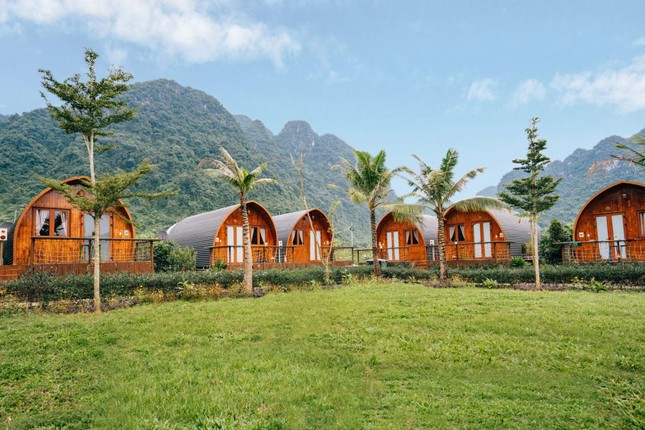
The uncontrolled spread of homestay and farmstay establishments without proper planning.
The 2024 Land Law clearly stipulates in Article 218 that agricultural land can be used for multiple purposes to increase income, but only for combined use. The primary purpose remains agricultural, and there should be no change in land use purpose.
According to Clause 1, Article 218 of the 2024 Land Law, the use of land for multiple purposes must adhere to specific requirements: it must not change the land type as classified and specified in relevant land documents; it should not compromise the conditions necessary to revert the land to its primary purpose; it must not affect national defense and security; it should minimize impacts on natural ecosystem conservation, biodiversity, and environmental landscape; it must not interfere with the land use of adjacent plots; it entails fulfilling financial obligations as per regulations; and it requires compliance with relevant laws.

